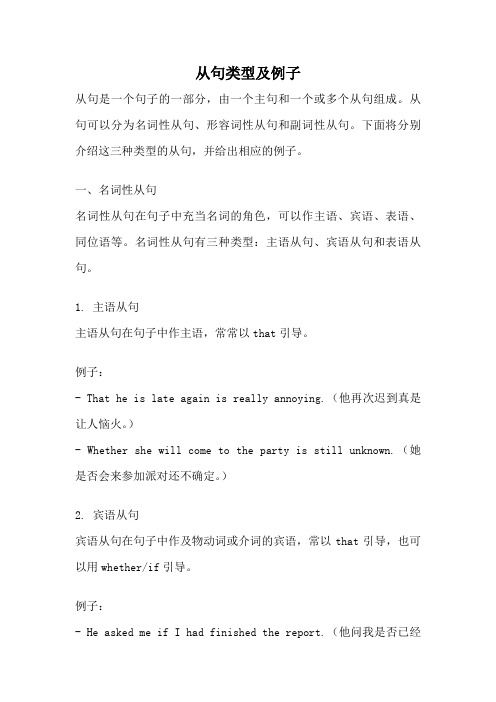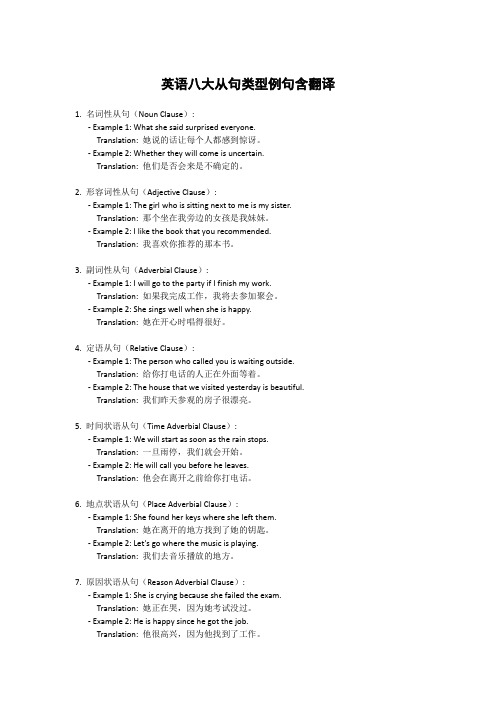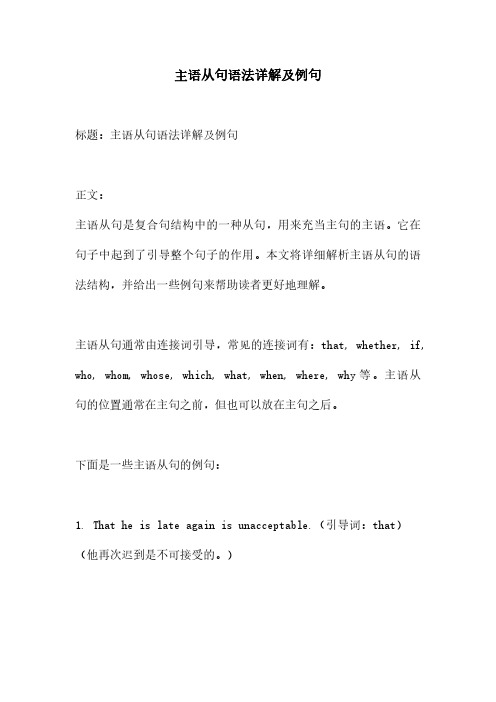各类从句讲解与例句
从句类型及例子

从句类型及例子从句是一个句子的一部分,由一个主句和一个或多个从句组成。
从句可以分为名词性从句、形容词性从句和副词性从句。
下面将分别介绍这三种类型的从句,并给出相应的例子。
一、名词性从句名词性从句在句子中充当名词的角色,可以作主语、宾语、表语、同位语等。
名词性从句有三种类型:主语从句、宾语从句和表语从句。
1. 主语从句主语从句在句子中作主语,常常以that引导。
例子:- That he is late again is really annoying.(他再次迟到真是让人恼火。
)- Whether she will come to the party is still unknown.(她是否会来参加派对还不确定。
)2. 宾语从句宾语从句在句子中作及物动词或介词的宾语,常以that引导,也可以用whether/if引导。
例子:- He asked me if I had finished the report.(他问我是否已经完成了报告。
)- I don't know whether he will come or not.(我不知道他是否会来。
)3. 表语从句表语从句在句子中作表语,常以that引导,也可以用whether/if 引导。
例子:- The fact is that he is a talented musician.(事实是他是一位有才华的音乐家。
)- My concern is whether we can finish the project on time.(我关心的是我们是否能按时完成项目。
)二、形容词性从句形容词性从句用于修饰名词或代词,相当于一个形容词,一般由关系代词(如who, whom, whose, which, that)或关系副词(如when, where, why)引导。
1. 关系代词引导的形容词性从句关系代词引导的形容词性从句修饰先行词,在从句中充当某一成分。
九种状语从句的引导词及例句-概述说明以及解释

九种状语从句的引导词及例句-概述说明以及解释1.引言文章1.1 概述部分的内容可以如下所示:引言是文章的开头部分,用来引出文章的主题和目的。
在本文中,我们将探讨九种状语从句的引导词及其例句。
状语从句是句子中的一个从句,用来修饰或补充主句的意思,起到说明、解释、强调等作用。
通过学习和掌握这九种状语从句的引导词和例句,我们可以更准确地表达自己的意思,使句子更加丰富多样,增加语言表达的灵活性。
同时,了解状语从句的不同引导词所表达的意义和用法,有助于我们更好地理解他人的意思,增进沟通和交流的效果。
本文将分别介绍九种状语从句的引导词及其例句,并对其用法进行详细解释和举例说明。
通过逐个进行分析,我们可以更深入地理解每种引导词的特点和用法,并掌握在实际应用中的技巧。
在正文部分,我们将分别对引导词1到引导词9进行介绍,包括引导词的意义、用法以及具体的例句。
在结论部分,我们将对所学内容进行总结,并展望未来在语言表达中更加灵活运用九种状语从句的引导词的可能性。
通过阅读本文,我们将获得对九种状语从句的引导词及其例句的全面理解,并且能够在实际应用中灵活运用,提升自己的语言表达能力。
让我们一起开始探索九种状语从句的引导词吧!1.2 文章结构本文将分为三个部分进行阐述。
首先,我们将给出九种状语从句的引导词的概述。
其次,我们将逐个详细介绍这九种引导词,并给出例句来说明其用法。
最后,我们将对这九种引导词进行总结,并展望它们在实际写作中的应用。
通过这样的文章结构,我们将全面深入地了解九种状语从句的引导词及其用法。
章1.2文章结构部分的内容1.3 目的本文的目的是介绍九种状语从句的引导词及其使用方法,并通过例句来展示这些引导词在句子中的运用。
通过学习这些引导词,读者可以更好地理解和运用状语从句,提高写作和阅读的能力。
具体而言,本文的目标如下:1. 提供九种常见的状语从句引导词,包括时间、地点、条件、原因、结果、目的、方式、让步和比较等方面的引导词,帮助读者掌握常见的引导词的用法和特点。
各种从句总结

各种从句总结:1.主语从句引导主语从句的连词有:that,where;疑问代词有:who,that,which;疑问副词有:when,where,why,how;(1)that引导的主语从句That在主语从句中无任何意义,不充当任何成分,通常不能省略。
例句:That he will succeed is certain.他会成功是肯定的。
常用it作形式主语,而将that从句置于句尾。
例句:It is certain that he will succeed.他会成功,这是肯定的。
若以that从句为主语的句子是疑问句,只能用it作形式主语。
例句:Is it certain that he will succeed?确定他会成功吗?It作形式主语位于句首时有以下四种结构:①It+be+形容词+that从句,例句:It is strange that no one wants to go there.真奇怪,竟然没有人想去那里。
②It+be+名词词组+that从句,例句:It is a pity that he can’t attend the party.真遗憾,他不能参加晚会。
③It+be+-ed分词+that从句,例句:It is said that he was a famous writer.据说他曾是一名著名的作家。
④It+seems/appears等不及物动词+that从句,例句:It seems that it is going to rain soon.看起来天马上要下雨了。
(2)whether引导的主语从句例句:Whether she will go there is not known.还不知道她是否要去那里。
(3)wh-疑问词引导的主语从句例句:What we need is your help.我们需要的正是你的帮助。
Why he did this is not known.他为什么要这样做还不知道。
英语八大从句类型例句

英语八大从句类型例句含翻译1. 名词性从句(Noun Clause):- Example 1: What she said surprised everyone.Translation: 她说的话让每个人都感到惊讶。
- Example 2: Whether they will come is uncertain.Translation: 他们是否会来是不确定的。
2. 形容词性从句(Adjective Clause):- Example 1: The girl who is sitting next to me is my sister.Translation: 那个坐在我旁边的女孩是我妹妹。
- Example 2: I like the book that you recommended.Translation: 我喜欢你推荐的那本书。
3. 副词性从句(Adverbial Clause):- Example 1: I will go to the party if I finish my work.Translation: 如果我完成工作,我将去参加聚会。
- Example 2: She sings well when she is happy.Translation: 她在开心时唱得很好。
4. 定语从句(Relative Clause):- Example 1: The person who called you is waiting outside.Translation: 给你打电话的人正在外面等着。
- Example 2: The house that we visited yesterday is beautiful.Translation: 我们昨天参观的房子很漂亮。
5. 时间状语从句(Time Adverbial Clause):- Example 1: We will start as soon as the rain stops.Translation: 一旦雨停,我们就会开始。
状语从句例句写作

一、时间状语从句1.读书的时候,你最好做笔记。
When you read a book, you’d better make notes.2.当我们正在讨论问题时,她们冲进来了。
They rushed in while we were discussing problems.我喜欢英语,而他喜欢数学。
3.随着时间的推移,天气越来越暖和了。
她们沿着河边走边谈。
They talked as they walked along the river.4.我要一直等到我朋友来。
I will wait for my friend until he comes.5. 我们自从分手以后一直没见过面。
We have not seen each other since we parted.6. 我必须在回家之前写完这封信。
I must finish this letter before I go home.7. 闹钟一响,我就立刻跳下床。
As soon as I hear my alarm clock, I jump out of my bed.8. 我每次见到他,他都在拼命的工作。
Every time I see him, he is working hard.二、条件状语从句1. 如果下周天气不好,我不会去上学,If the weather is terrible next week, I won’t go to school.2. 除非你立即走,否则你就会迟到。
You will be late unless you leave immediately,(=if you don’t leave immediately, you will be late.)3. 只要你努力学习,你就会取得进步。
三、让步状语从句1. 尽管他学习很努力,但进步还是很慢。
Though he works very hard, yet she makes very slow progress,2. 即使你这么说,我也不信。
各类从句讲解与例句

英语中六大从句用法总结1.主语从句1)主语从句可直接位于主语的位置,如果从句较长,谓语又较短,可用it作形式主语,而将从句放在句末。
常见的句型有:*It is a fact\a pity\a question\good news that...*It seems\appears\happened\has turned out that...*It is clear\important\likely\possible that...*It is said\reported\estimated\has been proved that...It is said that comic books create a connection between people of the same generation.It seems that the performance is very useful.2)what引导的主语从句表示“...的东西时”,一般不用it作形式主语。
What we lack is experience.3)what,who,when,why,whether等词含有各自的疑问意义,但它们引导的主语从句,都用陈述语序。
How the plan is to be carried out should be discussed again.I did know why I felt like crying.2.宾语从句1)宾语从句可位于及物动词、介词和某些形容词后。
连词that常可省略。
介词后一般接疑问词引导的宾语从句。
in that(因为),except that(除了),but that(只是)已构成固定搭配,其他介词后一般不接that引导的宾语从句。
*I promised that I would change the situation.*All this is different from what American young people would say about friendship.*He is certain that watching so much television is not good for children.*This article is well-written except that it is a bit too long.2)非谓语动词之后的宾语从句Reading that it was just a difference in custom, the foreigner smiled and said nothing. 这个外国人知道了这只是风俗的不同后,就笑了笑,没说什么。
英语从句辨析50个例句

英语从句辨析50个例句英语从句是英语语法中的一个重要部分,主要包括名词性从句、定语从句和状语从句。
以下是50个例句,用于帮助辨析不同类型的英语从句:一、名词性从句1、主语从句:What he said is not true.(他说的不是真的。
)2、宾语从句:I don't know if he will come.(我不知道他是否会来。
)3、表语从句:The question is who will go there.(问题是谁会去那里。
)4、同位语从句:The news that he resigned was surprising.(他辞职的消息令人惊讶。
)5、主语从句:Whether he will come or not remains uncertain.(他是否会来还不确定。
)6、宾语从句:I doubt whether he can finish the task on time.(我怀疑他是否能按时完成任务。
)7、表语从句:The question is when we should start the project.(问题是我们应该何时开始这个项目。
)8、同位语从句:The fact that she won the prize was a great honor for her family.(她获奖的事实对她家来说是一种极大的荣誉。
)9、The question whether we should proceed with the project remains unanswered. (我们是否应该继续这个项目的问题尚未回答。
)10、It's a fact that the company is going through a tough period. (公司正在经历困难时期,这是事实。
)11、The reason why he resigned was not made public. (他辞职的原因没有公开。
主语从句语法详解及例句

主语从句语法详解及例句标题:主语从句语法详解及例句正文:主语从句是复合句结构中的一种从句,用来充当主句的主语。
它在句子中起到了引导整个句子的作用。
本文将详细解析主语从句的语法结构,并给出一些例句来帮助读者更好地理解。
主语从句通常由连接词引导,常见的连接词有:that,whether,if, who,whom,whose,which,what,when,where,why等。
主语从句的位置通常在主句之前,但也可以放在主句之后。
下面是一些主语从句的例句:1.That he is late again is unacceptable.(引导词:that)(他再次迟到是不可接受的。
)2.Whether she will come to the party is still uncertain.(引导词:whether)(她是否会来参加派对还不确定。
)3.If it rains tomorrow,we will stay at home.(引导词:if)(如果明天下雨,我们会待在家里。
)4.Who will be the next president is still unknown.(引导词:who)(下一任总统是谁还是未知数。
)5.What he said surprised me.(引导词:what)(他说的话让我感到惊讶。
)需要注意的是,主语从句和主句之间的动词一般是单数形式,根据主语从句的内容确定。
如果主语从句表示不确定性或选择性,动词通常使用单数形式。
除了上述例句中的连接词,还有一些其他的连接词可以引导主语从句。
例如,在特殊疑问句中,疑问词可以充当主语从句的引导词,如“Who stole my wallet?”(谁偷了我的钱包?)。
此外,一些表示建议、命令、要求等词语也可以引导主语从句,如“It is important that you arrive on time.”(你准时到达很重要。
)总结一下,主语从句在复合句中起到了重要的作用,用来充当主句的主语。
- 1、下载文档前请自行甄别文档内容的完整性,平台不提供额外的编辑、内容补充、找答案等附加服务。
- 2、"仅部分预览"的文档,不可在线预览部分如存在完整性等问题,可反馈申请退款(可完整预览的文档不适用该条件!)。
- 3、如文档侵犯您的权益,请联系客服反馈,我们会尽快为您处理(人工客服工作时间:9:00-18:30)。
英语中六大从句用法总结1.主语从句1)主语从句可直接位于主语的位置,如果从句较长,谓语又较短,可用it作形式主语,而将从句放在句末。
常见的句型有:*It is a fact\a pity\a question\good news that...*It seems\appears\happened\has turned out that...*It is clear\important\likely\possible that...*It is said\reported\estimated\has been proved that...It is said that comic books create a connection between people of the same generation.It seems that the performance is very useful.2)what引导的主语从句表示“...的东西时”,一般不用it作形式主语。
What we lack is experience.3)what,who,when,why,whether等词含有各自的疑问意义,但它们引导的主语从句,都用陈述语序。
How the plan is to be carried out should be discussed again.I did know why I felt like crying.2.宾语从句1)宾语从句可位于及物动词、介词和某些形容词后。
连词that常可省略。
介词后一般接疑问词引导的宾语从句。
in that(因为),except that(除了),but that(只是)已构成固定搭配,其他介词后一般不接that引导的宾语从句。
*I promised that I would change the situation.*All this is different from what American young people would say about friendship.*He is certain that watching so much television is not good for children.*This article is well-written except that it is a bit too long.2)非谓语动词之后的宾语从句Reading that it was just a difference in custom, the foreigner smiled and said nothing. 这个外国人知道了这只是风俗的不同后,就笑了笑,没说什么。
On being asked whether he had any good food in Germany, he answered ”Terrible”. 一问到他在德国是否吃过什么好菜,他就回答说:“糟糕的很”。
3)宾语从句后如有宾补,要用形式宾语it来代替,而把宾语从句移至宾补之后。
He has made it clear that he would not change his mind.4)在think,believe,suppose,expect等动词后的宾语从句中,如果谓语是否定的,一般将否定词移至主句谓语上,宾语从句则变成肯定形式。
He didn't think that the money was well spent.3.表语从句表语从句出现在结构为“主语+系动词+表语从句”的句子中。
表语从句除可用that,what,when,why,whether,how 等引导外,还可由because,as if(though)等引导。
不缺其他成分时,用that引导,且不可省略。
如主句主语为reason,只能用that引导表语从句,不可用because.Perhaps the most important thing to remember is that there is no one common type of life in America.The reason why so many people died there is that there were not enough food supplies.It looks as if successful international cultural communication will make the world smaller.4.同位语从句同位语从句用于对前面出现的名词作进一步说明,一般用连词that引导,由于先行名词的意义不同,也可用whether,who,when,where,what,why,how等引导。
常见的先行名词有fact,idea,belief,news,hope,conclusion,evidence,suggestion,order,problem,report,decision.有时由于谓语较短,将同位语从句位于谓语之后。
She finally made the decision that she would join the fashion show.I had no idea how many books I could borrow at a time.The news came that their team had won the championship.5.定语从句定语从句所修饰的先行词可以是名词或代词,也可以是一个句子。
定语从句通常位于先行词之后,由关系代词或关系副词引导。
*限制性定语从句限制性定语从句修饰先行词,对先行词起修饰作用,紧接先行词之后,无逗号,若省去,原句意思不完整。
引导定语从句的关系代词有who,whom,whose,which,that等。
who,whom,whose用于指人,whose有时也可指物,相当于of which;which用于指物;that既可指人也可指物,但只用于限制性定语从句中。
关系代词除了引导定语从句,替代先行词外,还在从句中担任主语、宾语、定语等。
The computers and cables which make up the Internet are owned by people and organizations.Those who live alone or who are sick may have trouble in getting close to other people.The girl whose parents died in an accident is living with her grandmother.1)当先行词是all,anything,everything,something,nothing等不定代词或先行词前有first,last,any,few,much,some,no,only以及形容词最高级修饰时,只能用关系代词that引导从句。
That is all that I've heard from him.He's the first person that I'm going to interview this afternoon.2)关系代词的省略在从句中作宾语的关系代词常可省略。
关系代词紧跟介词,作介词宾语时不可用that,只可用which或whom 引导从句,并且不可省略,但当介词位于宾语从句句末时,作为介词宾语的关系代词仍可用that,也可省略。
This is one of those things with which we have to put up.This is one of those things (which\that) we have to put up with.3)引导定语从句的关系副词有when,where,why等。
关系副词在从句中作状语,意义上相当于一个“介词+which”的结构。
Even in comic books where(=in which) there are no words,the stories are fully expressed through the drawings.No one knows the reason why(=for which) he was so angry that day.5.定语从句*非限制性定语从句非限制性定语从句既可修饰先行词,也可修饰整个主句,起补充说明作用,与主句之间有逗号隔开,若省去,原句意思不受影响。
不可用that引导非限制性定语从句。
关系词不可省略。
Every object has a gravitational pull,which is rather like magnetism.*“介词+which\whom\whose”引导的定语从句“介词+which\whom\whose”可引导限制性定语从句,也可引导非限制性定语从句,该结构中介词的选择取决于从句谓语动词的固定搭配,或先行词的习惯搭配。
This is the computer on which he spent all his savingsIt is written by a person with whom we are all familiar.*as引导的定语从句as引导的定语从句主要用于“such...as”及“the same...as”的结构中,代替先行词是人或物的名词。
as引导非限制性定语从句时,代替整个主句,从句可位于主句之前、之后或中间。
These are not such problems as can be easily solved.(as代替先行词problems)As is mentioned above,no single company or group can control what happens on the Internet.(as代替主语)6.状语从句*时间状语从句引导时间状语从句的从属连词和词组有:1)when,whenever,while,as,after,before,since,till,until,once等。
We have learnt quite a lot about it since we came here.2)as soon as,hardly(scarcely)...when,no sooner...than,each(every) time,the moment,immediately(that)等。
